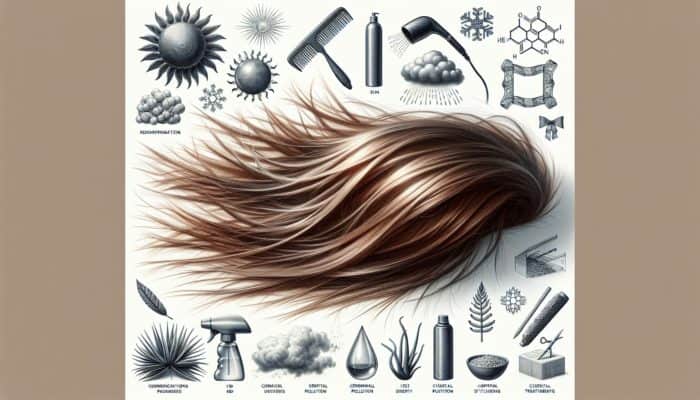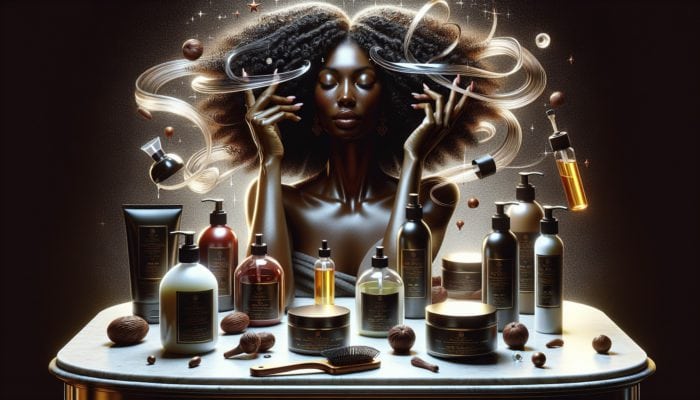Discover the Key Factors Behind Dry Hair Ends and How to Combat Them
Identifying the Main Causes of Hair Dryness and Damage

Dealing with dry hair ends is a prevalent concern for many individuals, and it can arise from a multitude of environmental factors, heat styling, and chemical treatments. Prolonged exposure to elements such as the sun, wind, and pollution can deplete your hair of the vital moisture it needs, resulting in a dull and brittle appearance. Furthermore, frequent use of heat styling tools—including straighteners and curlers—can significantly alter the structural integrity of your hair, leading to weakened ends susceptible to damage. Additionally, chemical treatments like hair colouring, perming, and relaxing can exacerbate dryness by stripping away the natural oils and moisture that your hair relies on. This interplay of factors not only contributes to the formation of split ends but also heightens the risk of hair breakage, underscoring the critical need for effective hydration. By embracing a holistic approach to your hair care routine, you can markedly improve the state of your dry ends, fostering healthier and more resilient hair over time.
The Essential Role of Hydration in Achieving Luscious Hair
Proper hydration is not only about aesthetics; it is fundamental to the overall health and vitality of your hair. When your hair ends are dry and brittle, you may encounter a range of problems, including split ends and heightened breakage, which can severely restrict your styling options and present an unkempt look. By prioritising the best methods for hydrating dry hair ends, you can effectively replenish moisture levels, boost elasticity, and enhance the natural shine of your hair, which is vital for efficient maintenance. Moreover, well-hydrated ends serve as a protective barrier against further damage, shielding your hair from various environmental stressors. Thus, making hydration a top priority is not just a temporary fix; it represents a crucial investment in the long-term health and resilience of your hair.
Recognising the Warning Signs of Dehydration in Your Hair
Identifying the signs of dehydration in your hair is essential for timely and effective intervention. A dry, brittle texture, a distinct lack of shine, and increased frizz are all critical indicators that your hair ends are in desperate need of moisture. When hair becomes excessively dry, it often feels rough and may become tangled easily, leading to frustration during styling. Furthermore, inadequate hydration can compromise your hair’s natural bounce, causing it to appear flat and lifeless. By remaining vigilant and attentive to these warning signs, you can implement the best strategies for hydrating dry hair ends before the situation deteriorates, ensuring your hair stays vibrant and healthy.
Implementing Effective Techniques for Moisturising Your Hair Ends

Moisturising dry hair ends is crucial for rejuvenating their health and improving their overall appearance. Among the most effective methods available are deep conditioning treatments, as they penetrate deeply into the hair shaft, delivering intensive hydration that can dramatically transform your hair's texture. The use of leave-in conditioners serves a dual purpose, providing essential moisture while simultaneously offering protection throughout the day. Additionally, incorporating natural oils such as argan, coconut, or jojoba into your hair care routine can yield remarkable results. These oils not only hydrate but also deliver vital fatty acids and vitamins, promoting improved overall health. By consistently employing these techniques, you can ensure that your hair remains manageable, vibrant, and healthy. Selecting the appropriate moisturising methods can significantly enhance the state of your hair ends, revealing their full potential for beauty and strength.
Establishing Proactive Strategies to Prevent Hair Dryness
Prevention is always preferable to a cure, particularly when it involves maintaining healthy hair. Safeguarding your hair from damaging heat and sun exposure is integral to its long-term health. Always apply a heat protectant prior to using styling tools, and consider wearing hats or scarves when exposed to intense sunlight to shield your hair from harmful UV rays. Furthermore, limiting the frequency of chemical treatments can significantly reduce the likelihood of developing dryness and damage. Regular trims are another essential practice; they help eliminate split ends and damaged sections, promoting healthier growth. By embedding these preventive measures into your hair care routine, you can set the stage for vibrant, well-hydrated hair that is less susceptible to damage.
Effective Daily Strategies for Maintaining Optimal Hydration
Establishing a Consistent Conditioning Routine for Healthier Hair

Incorporating a consistent conditioning routine into your hair care practices can yield exceptional results in preserving optimal moisture levels. Daily conditioning is a highly effective means of replenishing lost moisture and keeping your hair ends hydrated and smooth. When you apply conditioner, it envelops the strands, providing a protective layer against environmental stressors. Many modern conditioners boast advanced formulations that help seal in moisture, making them ideal for daily use. Choose conditioning products specifically designed for dry or damaged hair to maximise their benefits. By committing to a regular conditioning regimen, you will observe a significant enhancement in the texture and vitality of your hair, particularly at the ends, resulting in a healthier overall appearance.
Maximising the Advantages of Leave-In Treatments for Continuous Hydration
Leave-in conditioners can be transformative in sustaining hydration levels in your hair. They provide ongoing moisture throughout the day, acting as a protective barrier against environmental damage that can lead to dryness. Unlike traditional conditioners, leave-in treatments are intended to be applied to damp hair and left in without rinsing, allowing their hydrating properties to penetrate more deeply into the hair shaft. These products typically contain ingredients that aid in locking in moisture, making them particularly effective for individuals dealing with frizz and dryness. By integrating a leave-in treatment into your daily hair care routine, you not only boost moisture levels but also simplify styling, ensuring your hair remains luscious, manageable, and healthy.
Understanding the Importance of Protective Styling for Enhanced Moisture Retention
Protective styling is not merely a passing trend; it is a vital technique for preserving moisture in your dry hair ends. Hairstyles that minimise exposure to damaging environmental elements can significantly aid in maintaining hydration and preventing breakage. For instance, styles such as braids, buns, and updos can shield your hair from the harmful effects of wind and sun while also reducing friction that can lead to damage. Furthermore, using satin or silk scarves at night can help minimise moisture loss during sleep, contributing to healthier hair. By embracing protective styles, you can enjoy a variety of versatile looks without compromising the health and vitality of your hair. Think of protective styling as a safeguard, ensuring that your hair remains hydrated and resilient for prolonged periods.
Utilising Natural Oils for Effective Moisturisation of Hair Ends
Natural oils such as argan and coconut oil serve as formidable allies in the battle against dry hair ends. These oils penetrate the hair shaft efficiently, providing deep nourishment and hydration that often surpasses conventional moisturising products. Rich in essential fatty acids, antioxidants, and vitamins, these oils not only hydrate but also strengthen the hair, significantly diminishing the risk of breakage. You can apply oils in various ways—whether as a pre-wash treatment, a finishing touch after styling, or as a leave-in solution. The versatility of these oils renders them indispensable in any hair care regimen aimed at moisture retention. By incorporating moisturising oils into your routine, you can transform your dry ends into soft, manageable locks brimming with life and vitality.
Utilising Hydrating Mists for Quick Refreshes Throughout the Day
Hydrating mists offer a delightful and convenient method for refreshing your hair during the day. Formulated with water and beneficial ingredients, these mists provide an instant moisture boost, making them an excellent solution for combating dry hair ends. Spraying a hydrating mist onto your hair not only revitalises it but also enhances its natural shine, creating a healthier overall appearance. Many mists contain additional nourishing components like aloe vera or glycerin, which further enhance the hydration process. Keeping a bottle in your bag allows you to apply it whenever necessary, ensuring your hair remains fresh and nourished throughout the day. This straightforward yet effective technique can significantly elevate the way your hair looks and feels, contributing to overall hair health.
Exploring Natural Remedies for Effective Hair Hydration
Utilising Coconut Oil for Deep and Lasting Hydration
Coconut oil is far from a fleeting trend; it is a time-honoured remedy renowned for its remarkable moisturising properties. This oil penetrates the hair shaft more effectively than many other oils, offering deep hydration capable of revitalising even the driest ends. The lauric acid contained in coconut oil possesses antimicrobial properties, making it an excellent choice for individuals focused on maintaining scalp health. To use coconut oil effectively, apply it generously to the ends of your hair, massaging it in to promote optimal absorption. You can choose to leave it on for a couple of hours or overnight for a more intensive treatment. By incorporating coconut oil into your hair care routine, you will experience a remarkable transformation in both the texture and overall health of your ends.
Harnessing Aloe Vera Gel for Soothing and Hydrating Effects
Aloe vera gel is a traditional remedy celebrated for its soothing and hydrating properties. Loaded with vitamins and amino acids, aloe vera can significantly benefit dry hair ends by delivering essential moisture and nourishment. Applying aloe vera gel directly to your hair not only hydrates but also promotes a healthy shine that enhances your hair's overall appearance. The high water content found in aloe vera aids in locking in moisture, creating a protective barrier against environmental damage. You can use aloe vera as a leave-in treatment or mix it with your regular conditioner for an extra hydration boost. The versatility of aloe vera makes it a must-have in your natural hair care arsenal, ensuring your hair maintains optimal hydration levels.
Creating a Honey and Water Mask for Natural Hydration
A honey and water mask is a simple yet effective DIY remedy that functions as a natural humectant. Honey is exceptional at attracting moisture to the hair, ensuring that your ends remain hydrated for extended periods. To create this mask, simply mix honey with water until you achieve a runny consistency. Apply the mixture generously to your hair ends and allow it to sit for approximately 30 minutes before rinsing thoroughly. This treatment is particularly beneficial for individuals with colour-treated or chemically processed hair, as it helps to restore moisture levels while enhancing overall shine. Regular application of a honey and water mask can keep your hair looking vibrant, hydrated, and full of life.
Combining Avocado and Olive Oil for Deep Nourishing Benefits
Avocado is a nutrient powerhouse, packed with healthy fats, vitamins, and minerals that are essential for maintaining optimal hair health. When paired with olive oil, the outcome is a deeply nourishing treatment capable of hydrating even the driest ends. The fatty acids found in avocado penetrate the hair shaft effectively, while olive oil assists in locking in moisture and boosting overall shine. To prepare this treatment, simply mash a ripe avocado and mix it with a tablespoon of olive oil, then apply it to your hair, focusing on the ends. Leave this luxurious treatment on for 30 to 60 minutes before rinsing thoroughly. This powerful combination not only hydrates but also improves elasticity, making it an excellent option for anyone seeking to rejuvenate their dry hair ends.
Making Informed Choices Regarding Hair Products
Essential Hydrating Ingredients to Seek in Hair Care Products
When selecting hair products specifically designed to combat dry hair ends, it is crucial to focus on ingredients known for their hydrating properties. Look for formulations that include hyaluronic acid, glycerin, and natural oils such as jojoba or almond oil. Hyaluronic acid is well-regarded for its exceptional moisture-retaining abilities, while glycerin functions as a humectant that attracts moisture from the environment. Natural oils not only provide hydration but also nourish the hair, supplying essential nutrients that promote overall health and vitality. By choosing products enriched with these key ingredients, you can effectively combat dryness and enhance the vitality of your hair, leading to healthier ends.
Identifying Harmful Chemicals to Avoid in Hair Care Products
Equally important as the ingredients you should seek out are those you should actively avoid. Strong chemicals, such as sulfates and alcohols, can strip moisture from your hair, worsening dryness and causing damage. Sulfates, commonly found in many shampoos, can lead to excessive dryness by removing natural oils from the hair. Likewise, alcohols, particularly short-chain varieties, can further dry out your hair ends, resulting in frizz and breakage. Always scrutinise product labels carefully, opting for sulfate-free and alcohol-free alternatives to help maintain the moisture balance in your hair. This cautious approach will support your efforts in discovering the best methods for hydrating dry hair ends effectively, ensuring your hair remains healthy and vibrant.
Exploring a Range of Product Types for Optimal Hair Care
When tackling dry hair ends, it is beneficial to consider a diverse array of product types to cater to your specific needs. Deep conditioning masks are particularly advantageous for intensive hydration, delivering concentrated doses of moisture that can rejuvenate your hair. Leave-in sprays offer convenient hydration throughout the day, while serums specifically designed for dry ends can impart extra shine and protection. Do not hesitate to experiment with different products to determine what works best for your hair type and lifestyle. The right combination of product types can create a comprehensive hydrating regimen that transforms your hair from dry and brittle to soft, luscious, and vibrant.
Enhancing Hydration Through Dietary and Lifestyle Changes
Emphasising Adequate Hydration and Water Intake
Hydration begins from within, and consuming sufficient amounts of water is essential for maintaining overall health, including the health of your hair. When your body is adequately hydrated, this is reflected positively in the condition of your hair, contributing to moisture retention at the ends. Aim to drink approximately 2 to 3 litres of water daily, adjusting this amount based on your activity level and environmental conditions. If you find it challenging to meet your daily water intake, consider infusing it with fruits or herbs for added flavour and appeal. This simple adjustment can yield significant benefits, enhancing not only the appearance of your hair but also your overall well-being and vitality.
Incorporating Nutrient-Dense Foods into Your Daily Diet
Your dietary choices play a pivotal role in the overall health of your hair. Incorporating foods rich in omega-3 fatty acids, vitamins, and minerals can support hydration and promote hair vitality. Fatty fish, such as salmon, along with avocados, nuts, and seeds, are exceptional sources of omega-3s that nourish the scalp and encourage healthy hair growth. Additionally, foods abundant in vitamins A, C, and E, as well as biotin, can significantly enhance moisture retention in your hair. Leafy greens, berries, and sweet potatoes contribute to a nutrient-dense diet that fosters healthy, hydrated hair. By being mindful of your dietary choices, you can make a substantial impact on the condition of your hair ends, ensuring they remain vibrant and well-nourished.
Avoiding Dehydrating Habits for Healthier Hair
Your lifestyle choices have a significant impact on your hair's hydration levels. Limiting your intake of caffeine and alcohol is crucial, as both can lead to dehydration, adversely affecting not only your hair but your entire body. Caffeine has a diuretic effect, which can result in increased water loss, while excessive alcohol consumption can dehydrate your system. If you indulge occasionally, balance it with ample water intake and hydrating foods to counteract the effects. Making these small yet impactful adjustments can dramatically improve your hair’s moisture levels, ensuring that your ends remain vibrant, healthy, and well-hydrated.
Exploring Professional Treatments for Intensive Hair Hydration
Investing in Professional Deep Conditioning Treatments
For those grappling with severely dry hair ends, professional deep conditioning treatments can deliver the intensive hydration that at-home products may struggle to provide. These salon services utilise high-quality formulations that penetrate deeply into the hair shaft, offering unmatched moisture and nourishment. Many salons offer specialised treatments tailored to individual hair types and needs, ensuring optimal results. Regular appointments for deep conditioning can dramatically transform dry hair into a manageable and vibrant mane. Investing in these professional services can yield long-lasting benefits, helping to maintain the health and beauty of your hair over time.
The Importance of Regularly Trimming Split Ends for Overall Hair Health
Consistent trims are essential for maintaining healthy hair, especially when combating dryness. Trimming split ends eliminates damaged hair, facilitating healthier growth and enhancing the overall appearance of your hair. While it may seem counterproductive to cut hair while aiming for length, regular trims can actually promote healthier growth. Aim for a trim every six to eight weeks, adjusting based on the condition of your hair. By prioritising trims, you can enhance hydration and ensure that your hair remains vibrant, resilient, and less prone to further damage.
Utilising Keratin Treatments for Optimal Moisture Restoration
Keratin treatments serve as an excellent option for restoring moisture and smoothness to dry and damaged hair ends. These professional treatments work by infusing keratin, a vital protein in hair, back into the strands. The result is smoother, shinier hair that is significantly less susceptible to frizz and damage. While keratin treatments can provide lasting results for several weeks, they require proper aftercare to maintain their effectiveness. By opting for a keratin treatment, you can achieve long-lasting hydration and a polished look that endures, making it a valuable addition to your hair care regimen.
Investing in Scalp Treatments for Comprehensive Hair Health
A healthy scalp forms the foundation of beautiful hair. Professional scalp treatments can nourish the scalp and promote healthier hair growth, which, in turn, can help alleviate dryness at the roots. Many scalp treatments incorporate exfoliating properties that remove dead skin cells, facilitating better product absorption and improved hydration. By investing in scalp treatments, you create an ideal environment for hair growth, ensuring that your ends receive the moisture and care they need for a healthy appearance.
Seeking Colour Correction Services to Revitalise Damaged Ends
If your dry hair ends result from previous colouring mishaps, colour correction services can assist in restoring both moisture and vibrancy. These professional treatments focus on repairing and rejuvenating damaged hair, often integrating deep conditioning formulas to enhance hydration. Colour correction may also involve adjusting the hair tone to eliminate unwanted brassiness or fading, leading to a more unified appearance. By consulting with a professional colourist, you can ensure that your hair not only looks its best but also remains well-hydrated and healthy, addressing the underlying causes of dryness.
Strategies for Preventing Future Hair Dryness
Reducing Heat Styling to Preserve Your Hair's Integrity
Excessive heat styling is a significant contributor to dry hair ends, and minimising the use of heat tools such as blow dryers, flat irons, and curling wands can greatly reduce the risk of dehydration and damage. Whenever you style your hair with heat, always apply a high-quality heat protectant to create a barrier against thermal damage. Additionally, consider air-drying your hair whenever possible or using lower heat settings on styling tools to safeguard your hair's integrity. By adopting these straightforward practices, you’ll protect your hair from future dryness, ensuring that your ends remain hydrated, healthy, and resilient over time.
Addressing Commonly Asked Questions About Hair Hydration
What Are the Main Causes of Dry Hair Ends?
Dry hair ends can arise from a variety of environmental factors, heat styling, and chemical treatments. These issues can lead to split ends and breakage, negatively impacting the overall health and appearance of the hair.
How Can I Naturally Hydrate My Dry Hair Ends?
Natural remedies such as coconut oil, aloe vera gel, and honey masks can effectively hydrate dry hair ends, restoring moisture and enhancing shine.
What Key Ingredients Should I Look for in Hair Products for Hydration?
Seek products enriched with hydrating ingredients like hyaluronic acid, glycerin, and natural oils while steering clear of harsh sulfates and alcohols.
How Often Should I Trim My Hair?
Regular trims every six to eight weeks are crucial for removing split ends, encouraging healthier hair growth, and maintaining optimum hydration.
Can My Diet Affect Hair Hydration?
Absolutely! A diet rich in omega-3 fatty acids, vitamins, and minerals supports hair health and hydration, contributing to well-hydrated ends.
Are Professional Treatments Beneficial for Dry Hair?
Yes, treatments such as deep conditioning and keratin treatments can deliver intensive hydration and enhance the overall condition of dry hair ends.
How Can I Maintain Moisture in My Hair Throughout the Day?
Utilising leave-in conditioners or hydrating mists can refresh your hair throughout the day, keeping your ends moisturised, manageable, and looking their best.
What Are the Best Oils for Hydrating Hair Ends?
Oils such as argan, coconut, and jojoba are excellent choices for deeply hydrating and nourishing dry hair ends, preventing further damage.
Is It Advisable to Use Heat Styling Tools on Dry Hair?
It's best to limit heat styling on dry hair, as it can exacerbate dryness and lead to further damage. Always use a heat protectant when styling.
What Are the Indicators of Dehydrated Hair?
Signs of dehydration include a brittle texture, lack of shine, and increased frizz. Regularly assess your hair's condition to implement timely interventions.
Connect with Us on Facebook for More Tips and Updates!
The Article: Best Ways to Hydrate Dry Hair Ends: Essential Tips appeared first on Amitys Hair Salon.
The Article Hydrate Dry Hair Ends: Essential Tips for Healthy Locks Was Found On https://limitsofstrategy.com

